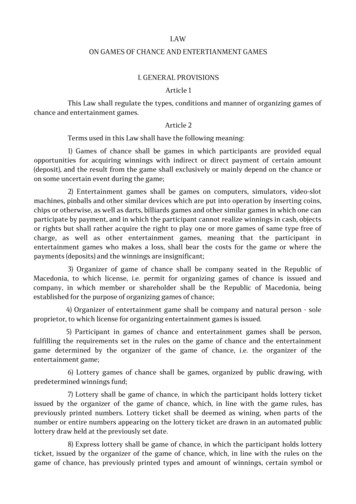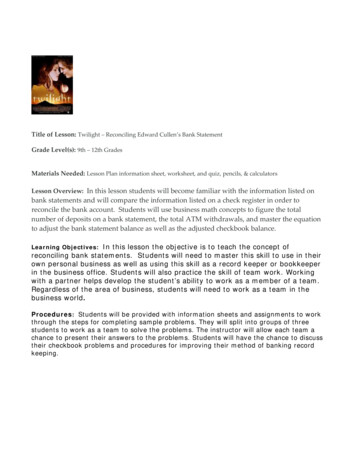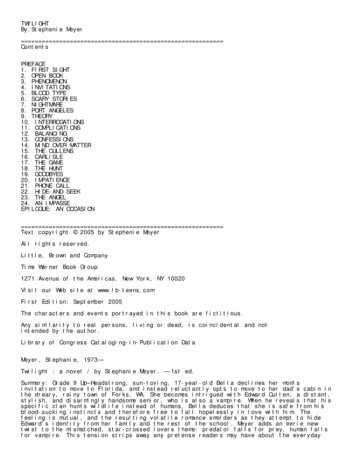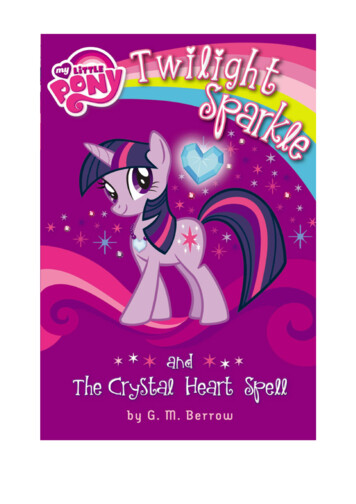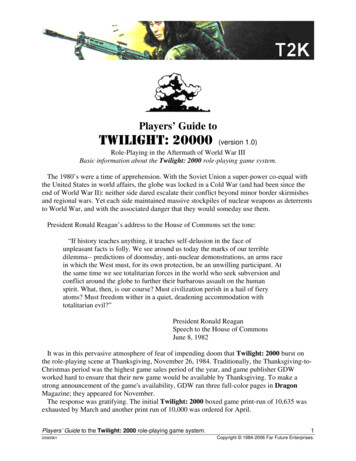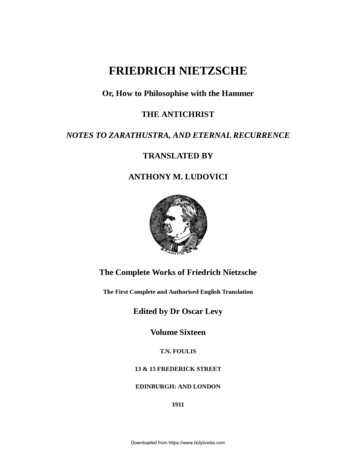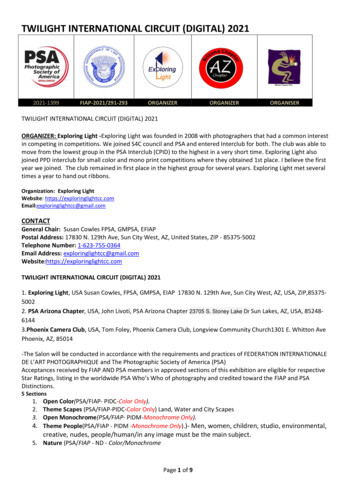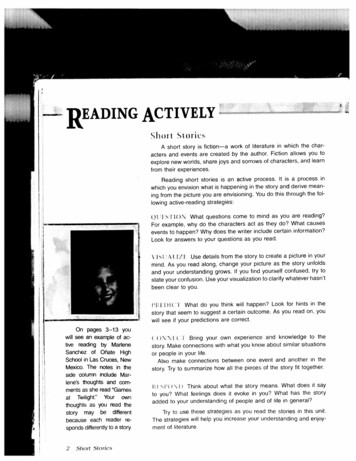
Transcription
READING ACTIVELYA short story is fiction—a work of literature in which the characters and events are created by the author. Fiction allows you toexplore new worlds. share joys and sorrows of characters, and learnfrom their experiences.Reading short stories is an active process. It is a process inwhich you envision what is happening in the story and derive meaning from the picture you are envisioning. You do this through the following active-reading strategies:What questions come to mind as you are reading?For example, why do the characters act as they do? What causesevents to happen? Why does the writer include certain information?Look for answers to your questions as you read.Use details from the story to create a picture in yourmind. As you read along, change your picture as the story unfoldsand your understanding grows. If you find yourself confused, try tostate your confusion. Use your visualization to clarify whatever hasn’tbeen clear to you.What do you think will happen? Look for hints in thestory that seem to suggest a certain outcome. As you read on, youwill see if your predictions are correct.On pages 3—13 youwill see an example of active reading by MarleneSanchez of Oñate HighSchool in Las Cruces, NewMexico. The notes in theside column include Marlene’s thoughts and comments as she read “Gamesat Twilight” Your ownthoughts as you read thestory may be differentbecause each reader responds differently to a story.2Short StoriesBring your own experience and knowledge to thestOry. Make connections with what you know about similar situationsor people in your life.Also make connections between one event and another in thestory. Try to summarize how all the pieces of the story fit together.Think about what the story means. What does it sayfeelings does it evoke in you? What has the storyWhat2to youadded to your understanding of people and of life in general?Try to use these strategies as you read the stories in this unit.The strategies will help you increase your understanding and enjoyment of literature.
ames at TwilightQuestion:Anita DesaiIt was still too hot to play outdoors. They had had their tea.had been washed and had their hair brushed. and altere long day of confinement in the house that was not cool butleast a protection from the sun, the children strained to gett. Their faces were red and bloated with the effort, but their9 )ther would not open the door, everything was still cur‘iined and shuttered in a way that stifled the children, maderem feel that their lungs were stuffed with cotton wool andeir noses with dust and if they didn’t burst out into the lighttmd see the sun and feel the air, they would choke.“Please, Ma, please,” they begged. “We’ll play in theeranda and porch—we won’t go a step out of the porch.”“You will, I know you will, and then—”“No—we won’t, we won’t,” they wailed so horrendously[hat she actually let down the bolt of the front door so thatthey burst out like seeds from a crackling, over-ripe pod intothe veranda, with such wild, maniacal yells that she retreatedmo her bath and the shower of talcum powder and the freshtm that were to help her face the summer evening.anPredict.boyConnect:-They faced the afternoon, It was too hot. Too bright. Thehite walls of the veranda glared stridently in the sun. Thebougainvillea hung about it, purple and magenta, in livid2illoons. The garden outside was like a tray made of beatenbrass, flattened out on the red gravel and the stony soil in all-,iiades of metal—aluminum, tin, copper and brass. No lifetirred at this arid time of day—the birds still drooped, likelead fruit, in the papery tents of the trees; some squirrels layVisualize:1. sari (sã’ r) n.: A long piece of cloth wrapped around the bodyrming a skirt and draped over one shoulder: worn by Hindumen.2. bougainvillea (boil gn vii’ ) n.: Woody. tropical vines with)wers.Games at Twilight3
—limp on the wet earth under the garden tap. The outdoor doglay stretched as if dead on the veranda mat, his paws and earsand tail all reaching out like dying travelers in search of water.He rolled his eyes at the children—two white marbles rollingin the purple sockets, begging for sympathy—and attemptedto lift his tail in a wag but could not. It only twitched and laystill.Then, perhaps roused by the shrieks of the children, aband of parrots suddenly fell out of the eucalyptus tree,tumbled frantically in the still, sizzling air, then sortedthemselves out into battle formation and streaked awayacross the white sky.The children, too, felt released. They too began tumbling,shoving, pushing against each other, frantic to start. Startwhat? Start their business. The business of the children’s daywhich is—play.“Let’s play hide-and-seek.”“Who’ll be It?”“You be It.”“Why should I? You be—”“You’re the eldest—”“That doesn’t mean—”The shoves became harder. Some kicked out. The motherly Mira intervened. She pulled the boys roughly apart. Therewas a tearing sound of cloth but it was lost in the heavypanting and angry grumbling and no one paid attention to thesmall sleeve hanging loosely off a shoulder.“Make a circle, make a circle!” she shouted, firmly pullingand pushing till a kind of vague circle was formed. “Nowclap!” she roared and, clapping, they all chanted in melancholy unison: “Dip, dip, dip—my blue ship—” and everynow and then one or the other saw he was sale by the way hishands fell at the crucial moment—palm on palm. or back ofhand on palm—and dropped out of the circle with a yell and ajump of relief and jubilation.Raghu was It. He started to protest, to cry “You cheated—Mira cheated—Anu cheated—” hut it was too late. theothers had all already streaked away. There was no one tohear when he called out, “Only in the veranda—the porch—Ma said—Ma said to stay in the porch!” No one had stoppedto listen, all he saw were their brown legs flashing through thedusty shrubs, scrambling up brick walls, leaping over cornQuestion:Connect:Visualize:4Short Stories
heaps and hedges. and then the porch stood empty in theitrple shade of the bougainvillea and the garden was ascmptv as before; even the limp squirrels had whisked away.jving everything gleaming. brassy and bare.Only small Manu suddenly reappeared. as if he hadh pped out of an invisible cloud or from a bird’s claws, and.[t od for a moment in the center of the yellow lawn, chewingh linger and near to tears as he heard Raghu shouting. withhis head pressed against the veranda wall. “Eighty-three.and then made off in aiIitv-five. eighty-nine, ninetyvinie. half of him wanting to fly north, the other half counselra4 south. Raghu turned just in time to see the flash of his.\ bite shorts and the uncertain skittering of his red sandals,nd charged after him with such a bloodcurdling yell thatManu stumbled over the hosepipe. fell into its rubber coilsmod lay there weeping, I won’t be It—you have to find themill—all—All!’’I know I have to, idiot,” Raghu said, superciliouslykicking him with his toe. “You’re dead,” he said with satisfaction, licking the beads of perspiration off his upper lip, andthen stalked off in search of worthier prey, whistling spiritedly so that the hiders should hear and tremble.tPredict:Connect:Ravi heard the whistling and picked his nose in a panic,trying to find comfort by burrowing the finger deep—deepinto that soft tunnel. He felt himself too exposed, sitting on anupturned flower pot behind the garage. Where could heburrow? He could run around the garage if he heard Raghucome—around and around and around—but he hadn’tmuch faith in his short legs when matched against Raghu’s3 Ravi had a frighteninglong, hefty, hairy footballer legs.glimpse of them as Raghu combed the hedge of crotons and4 trampling delicate ferns underfoot as he did so.hibiscus,Ravi looked about him desperately, swallowing a small ball ofsnot in his fear.The garage was locked with a great heavy lock to whichthe driver had the key in his room, hanging from a nail on the3. footbailer legs: The powerful legs of a soccer player.4. crotons (krOt’ nz) and hibiscus (hi bis’ kms(: Types of tropicalshrubs.Games at Twilight5
RACING GAML 1982Tonq WongCourtesy of the ArtistI
ill under his work-shirt. Ravi had peeped in and seen himill sprawling on his string-cot in his vest and striped underiuts. the hair on his chest and the hair in his nose shakingh the vibrations of his phlegm-obstructed snores. Ravi hadshed he were tall enough, big enough to reach the key onnail, but it was impossible. beyond his reach for years tone, He had sidled away and sat dejectedly on the flower pot.,.t at least was cut to his own size.tInt next to the garage was another shed with a big greenr. Also locked. No one even knew who had the key to thek. That shed wasn’t opened more than once a year whenturned out all the old broken hits of furniture and rolls ofating and leaking buckets, and the white ant hills were;iken and swept away and Flit sprayed into the spider websnd rat holes so that the whole operation was like the lootingi a poor, ruined and conquered city. The green leaves of the!,ur sagged. They were nearly off their rusty hinges. TheI iiiges were large and made a small gap between the door and1W walls—only just large enough for rats, dogs, and, possihiv, Ravi to slip through.Ravi had never cared to enter such a dark and depressing3 of defunct household goods seething with such‘iiortuarynispeakable and alarming animal life but, as Raghu’s whisrung grew angrier and sharper and his crashing and stormingii the hedge wilder, Ravi suddenly slipped off the flower potmd through the crack and was gone. He chuckled aloud withmstonishment at his own temerity so that Raghu came out ofae hedge, stood silent with his hands on his hips, listening,nd finally shouted “I heard you! I’m coming! Got you—” andime charging round the garage only to find the upturnedlower pot, the yellow dust, the crawling of white ants in anud-hill against the closed shed door—nothing. Snarling, he)ent to pick up a stick and went off, whacking it against thegarage and shed walls as if to beat out his prey.Visualize:Predict:Ravi shook, then shivered with delight, with self‘ongratulation. Also with fear. It was dark, spooky in theshed. It had a muffled smell, as of graves. Ravi had once got5. mortuary (mOr’ chö er ) it: A place where dead bodies are keptfore being buried or cremated.Games at Twilight7
Connect:Question:Question:Connect:8Short Storieslocked into the linen cupboard and sat there weeping for halfan hour before he was rescued. But at least that had beenafamiliar place, and even smelled pleasantly of starch, laundryand. reassuringly, of his mother. But the shed smelled of rats,ant hills, dust and spider webs. Also of less definable, lessrecognizable horrors. And it was dark. Except ftr the whitehot cracks along the door, there was no light. The roof wasvery low. Although Ravi was small, he felt as if he could reachup and touch it with his finger tips. But he didn’t stretch.Hehunched himself into a ball so as not to bump into anything,touch or feel anything. What might there not be to touch himand feel him as he stood there, trying to see in the dark?Something cold, or slimy—like a snake. Snakes! He leaptupas Raghu whacked the wall with his stick—then, quicklyrealizing what it was, felt almost relieved to hear Raghu. hearhis stick. It made him feel protected.But Raghu soon moved away. There wasn’t a sound oncehis footsteps had gone around the garage and disappeared.Ravi stood frozen inside the shed. Then he shivered all over.Something had tickled the back of his neck. It took him awhile to pick up the courage to lift his hand and explore. Itwas an insect—perhaps a spider—exploring him. Hesquashed it and wondered how many more creatures werewatching him, waiting to reach out and touch him. thestranger.There was nothing now. After standing in that position—his hand still on his neck, feeling the wet splodge of thesquashed spider gradually dry—for minutes, hours, his legsbegan to tremble with the effort, the inaction. B’ now he couldsee enough in the dark to make out the large solid shapesofold wardrobes, broken buckets and bedsteads piled on top ofeach other around him. He recognized an old bathtub—patches of enamel glimmered at him and at last he loweredhimself onto its edge.He contemplated slipping out of the shed and into the fray.He wondered if it would not be better to be captured by Raghuand he returned to the milling crowd as long as he could beinthe sun. the light, the free spaces of the garden and thefamiliarity of his brothers, sisters and cousins. It wouldbeevening soon. Their games would become legitimate.Theparents would sit out on the lawn on cane basket chairs and
hem as they tore around the garden or gathered inshare a loot of mulberries or black, teeth-splittingfrom the garden trees. The gai dener would fixtheeinpe to the water tap and water would fall lavishly.li he air to the ground. soaking the dry yellow grassat’ red gra ci and arousing the s cet, the intoxicatingiii a water on dry earththat lovel jest scent in the world.i .nilled for a whiff of it. lie half-rose from the bathtub,a heard the despairing scream of one of the girls as Raghue down upon her. There was the sound of a crash, and oflang about in the bushes. the shrubs, then screams andi ising sobs of, ‘‘I touc bed the den—’ ‘‘YOU did notI“You liar, you did not” and then a fading away andIi)IIrIPredict:I—‘41rliCe agamRavi sat back Ofl the harsh edge of the tub, deciding tohId out a bit longer. What fun if they were all found andtught—he alone left unconquered! F-Ic had never knowni it sensation. Nothing more wonderful had ever happened tohim than being taken out by an uncle and bought a whole slabhocolate all to himself, or being flung into the soda-man’sony cart and driven up to the gate by the friendly driver withhe red beard and pointed ears, To defeat Raghu—thathirsute, hoarse-voiced football champion—and to be the7winner in a circle of older, bigger, luckier children—thatvould be thrilling beyond imagination. He hugged his kneestogether and smiled to himself almost shyly at the thoughtofso much victory, such 8laurels,Connect:HIThere he sat smiling, knocking his heels against thebathtub, now and then getting up and going to the doorto puthis ear to the broad crack and listening for soundsof thegame. the pursuer and the pursued, and then returning tohisseat with the dogged determination of the true winner, abreaker of records, a champion.6. jamuu (ja’ möön’) niuice1IA tart fruit with reddish-purple pulp and7. hirsute (hur’ södt’) iidj HairyS. laurels (br’ 31z) n Foliage trom the laurel tree wornin a crownas a s mOol of ictor iii a contestGaines at Twilight9
It grew darker in the shed as the light at the door grewsofter, fuzzier, turned to a kind of crumbling yellow pollenthat turned to yellow fur, blue fur, gray fur. Evening. Twilight.The sound of water gushing. falling. The scent of earthreceiving water, slaking its thirst in great gulps and releasingthat green scent of freshness, coolness. Through the crackRavi saw the long purple shadows of the shed and the garagelying still across the yard. Beyond that, the white walls of thehouse. The bougainvillea had lost its lividity, hung in darkbundles that quaked and twittered and seethed with massesof homing sparrows. The lawn was shut off from his view.Could he hear the children’s voices? It seemed to him that hecould. It seemed to him that he could hear them chanting,singing, laughing. But what about the game? What hadhappened? Could it be over? How could it when he was stillnot found?It then occurred to him that he could have slipped out longago, dashed across the yard to the veranda and touched the“den.” It was necessary to do that to win. He had forgotten.He had only remembered the part of hiding and trying to eludethe seeker. He had done that so successfully, his success hadoccupied him so wholly that he had quite forgotten thatsuccess had to be clinched by that final dash to victory andthe ringing cry of “Den!”With a whimper he burst through the crack, fell on hisknees, got up and stumbled on stiff, benumbed legs across theshadowy yard. crying heartily by the time he reached theveranda so that when he flung himself at the white pillar andbawled, “Den! Den! Den!” his voice broke with rage and pits’at the disgrace of it all and he felt himself flooded with tearsand misery.Out on the lawn, the children stopped chanting. They allturned to stare at him in amazement. Their faces were paleand triangular in the dusk. The trees and bushes aroundthem stood ink and sepulchral.4 spilling long shadowsacross them. They stared. wondering at his reappearance. hispassion. his wild animal howling, Their mother rose from herbasket chair and came toward him. worried. annoyed, saving.Visualize:Predict:Predict:Connect:9. sepulchral (s pul’ krl) adi Dismal: &loomy.10Short Stories
HIDE A4D SEEKTony WongCnLrty of (he 4rtistGames at Twilight11
wVisualize:I—“Stop it, stop It, Ravi. Don’t be a baby. Have you hurtyourself?” Seeing him attended to. the children went back toclasping their hands and chanting “The grass is green. therose is redBut Ravi would not let them. He tore himself out of hismother’s grasp and pounded across the lawn into their midst,charging at them with his head lowered so that they scatteredin surprise. “I won, I won, I won,” he bawled, shaking hishead so that the big tears flew. “Raghu didn’t find me. I won, Iwon—,,It took them a minute to grasp what he was saying, evenwho he was. They had quite forgotten him. Raghu had foundall the others long ago. There had been a fight about who wasto be It next. It had been so fierce that their mother hademerged from her bath and made them change to anothergame. Then they had played another and another. Brokenmulberries from the tree and eaten them. Helped the driverwash the car when their father returned from work. Helpedthe gardener water the beds till he roared at them and sworehe would complain to their parents. The parents had comeout, taken up their positions on the cane chairs. They hadbegun to play again, sing and chant. All this time no one hadremembered Ravi. Having disappeared from the scene, he haddisappeared from their minds. Clean.“Don’t be a fool,” Raghu said roughly. pushing him aside,and even Mira said. “Stop howling. Ravi. If you want to play.you can stand at the end of the line,” and she put him therevery firmly.The game proceeded. Two pairs of arms reached up andmet in an arc. The children trooped under it again and againin a lugubrious’0 circle, ducking their heads and intoning“The grass is green,The rose is red:Remember meWhen I am dead, dead, dead, dead.10. lugubrious (l gi’ br s) adj. Sad and mournful. especially inan exaggerated wa”.12Short Stories
d the arc of hin arms trembled in the twilight, and thewere bowed so sadly, and their feet tramped to thata holy refrain so mournfully, so helplessly, that RaviI not bear it. He would not follow them. he would not belcd in this funeral game. He had wanted victory andiph —not a funeral. But he had been forgotten. left Outa’ would not join them now. The ignominy of being[ten —how could he face it? He felt his heart go heavyahe inside him unbearably. He lay down full length onimp grass. crushing his face into it, no longer crying.ed by a terrible sense of his insignificance.Iignominy (ig’ n mm’e)Respond:n. Shame dishonor.1Iii i(1937—), born of an Indian father and a German[her, has been called one of India’s most gifted writers. She was([1 icated in Delhi, and her work has wonwidespread critical acLirn. Of Desai’s talent, the critic Victoria Glendinning said. “Sheis the gift of opening up a closed world and making it clearly visHe and, by the end, familiar.” Desai lives in Bombay with her busnid and their four children.iGaines at Tu’ilfght13
SPO”DI\G TO IHIJL1SnFlION1. Put yourself in Ravi’s place. What would youhave done after Raghu left the shed area? Explain your answer.2. If you could talk to Ravi, what would you tellhim about games?3. Where does Ravi hide?4. What causes Ravi to lose the game eventhough he wasn’t caught?5. How does Ravi feel about Raghu?6. What do we know about Ravi’s personalitybased on the choices he makes in the story?7. What bitter lesson does Ravi learn at the endof the story?8. Do you think that Ravi’s “sense of insignificance” at the end of the story will remainstrong? Explain.IAN4LY1TLfr LSii!” W,t:tiMotivation is the cause of a character’s actions. Motives can arise from events involving thecharacter, from the character’s emotional needs,or from a combination of both. For example, Raviis afraid of the shed. Yet he is motivated to overcome his fear because he wants to win the gameand because he is afraid of Raghu.1. What motivates Ravi to refuse to join the children in their evening game?2. What motivates the children to play othergames while Ravi is still hiding?FCR11H kL THJXIr\c A\I) RiRelevant details give information that is central to the situation, plot, or characters. Paying at14Short Storiestention to relevant details can give you insight intoa character’s motives or a character’s effect onothers. For instance, when Raghu finds Manu.Raghu kicks him and whistles “so that the hidersshould hear and tremble.’ Later. Desai describesRaghu as a football champion. These details imply that Raghu frightens the other children.1. Which details of the shed contribute to your understanding of Ravi’s determination to avoidRaghu?2. Ravi feels protected when he hears Raghupound on the shed with his stick. How doesthis detail relate to Ravi’s decision to stay inthe shed?3. When Raghu catches one of the girls, she insists that she “touched the den.” How does thisdetail relate to the outcome of the story?[liNKING ) RlTlN(i P t1 (tReading about characters in a story is insome ways like being with people in real life. Nowthat you have spent some time with Ravi, perhapsyou can guess how the events of the story willmotivate him in the future. Imagine the next fewdays, months, or years of his life, and think of howRavi’s behavior might be influenced by his experience in the shed. Then predict the effect of thisexperience on his behavior, supporting your prediction with evidence from the story.VILLR\ING OPTIONArt. Take another look at the pictures on pages6 and 11. They were not painted to illustrate“Games at Twilight.” yet they depict scenes similar to the ones depicted in the story. How do thesepaintings relate to the story? Try to find other photographs or works of fine art that remind you ofthe story. You might look in a museum or in booksof art in the library. If possible, bring to class thepictures you have found and show them to yourclassmates.
ames at Twilight Question: Anita Desai It was still too hot to play outdoors. They had their tea. boy had been washed and had their hair brushed. and alter Predict. e long day of confinement in the house that was not cool but least a protection from the sun, the children strained to get t. Th
